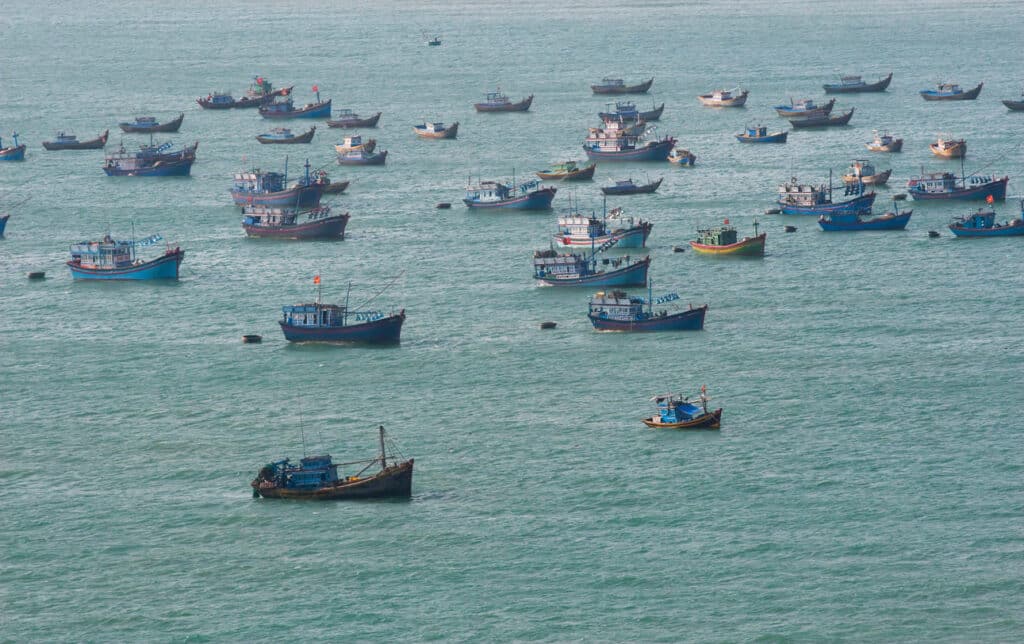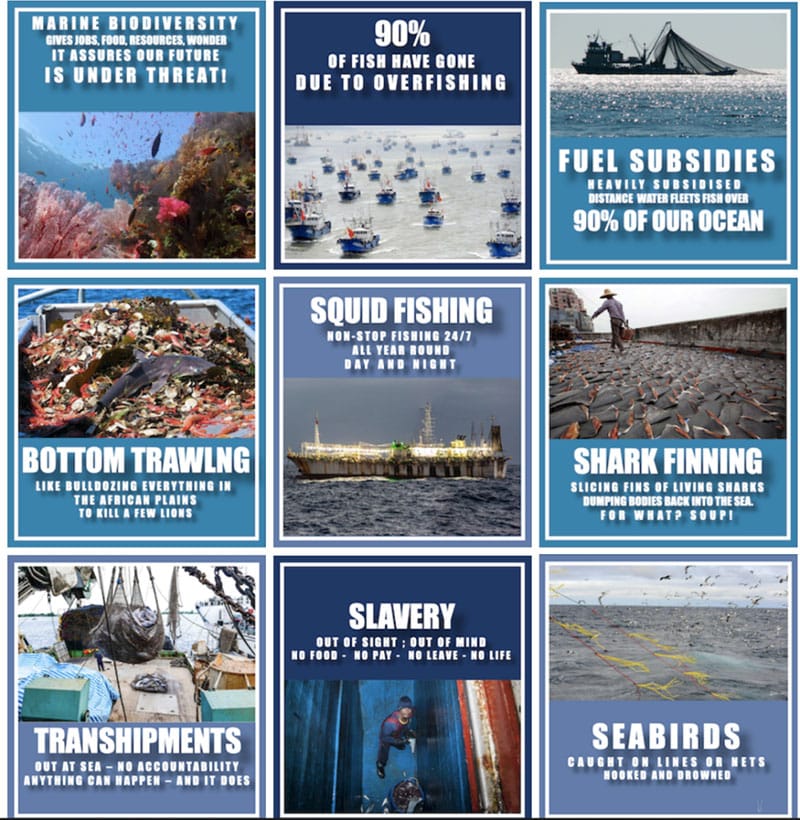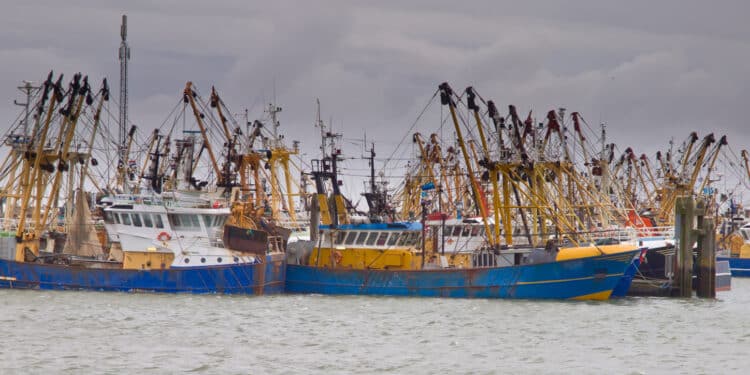When I was asked to write for Whistleblower Network News, I had a thought about what whistleblower means to me. A whistleblower exposes practices that are ethically or legally wrong and should be stopped immediately regardless of the backlash they may get. However, whistleblower protection and reward laws play a huge role in enabling these practices that shine a light on practices such as illegal fishing. Thank goodness there are organizations like the National Whistleblower Center that are working on laws around the world to protect whistleblowers around the world from retaliation and rewarded as appropriate.
While I have been involved in ocean protection for some time, I swore off tackling overfishing: it’s a hopeless black hole for which there seemed no solution except through slow international political deals with each side vying for their piece of the pie. All anthropomorphic-centric with no skin in the game for nature.
That all changed in August 2020 when a satellite picture revealed a Chinese fishing armada circling right next to the border of the Galapagos islands. These were distant water fishers, mainly squid jiggers, approximately 325, fishing night and day between a migratory corridor off Ecuador and the Galapagos islands. They could scoop up anything that crossed their paths leaving nothing behind. And it is all perfectly legal. Unfortunately, there is plenty of illegal fishing as well.

That was my motivation to finally jump in. Now the world could see with their own eyes the devastating scale of overfishing – both legal and not. It made me realize that the current regulatory framework that governs fishing and the high seas is obsolete: it cannot keep up with the current massive scale and power of non-stop factory fishing. As Charles Clover outlined in his book, The End of the Line, over a decade ago, our technology is so sophisticated, fishes have nowhere to rest, reproduce or hide. They are literally fishes being shot in a barrel.
And whether it is Asian nations fishing off the South American coastlines or the EU fishing vessels off the Indian ocean – these practices are leaving a long-lasting and devastating impact on the seas of those nations that depend on those resources.
In West Africa, artisanal fishers used to bring back fishes for sale and consumption. Now they come back with only plastic – but on the horizon they see huge EU factory vessels removing tons of fish from the edge of their waters and wonder if they cannot get a better life working for those fisheries. So, they migrate to Europe. This illustrates the interconnectivity of our lives and the ocean – and the consequences.
In addition, we must ask ourselves – at the current scale of extraction of fishes each year (well over the weight of one billion people) what is left behind and how can that be acceptable?

The current legal system is slow and unwieldy. By the time the laws are in place, the species or ocean they are trying to protect have disappeared! In the last six months alone:
- FAO: At a recent meeting a single country succeeded in removing Nature Based Solutions from any application to fishing practices
- WTO: SDG 14.6 began discussions 20 years ago on an explicit target to eliminate harmful fisheries subsidies by 2020 (used mostly for fuel subsidies to enable richer nations to fish off the coasts of poorer nations 24/7 depriving local artisanal fisheries of their livelihoods). Twenty years later those discussions still continue with no agreement.
- EU: Despite pressure to reduce fishing subsidies, EU continually supports more fishing subsidies despite this contravening its own EU objectives to create sustainable livelihoods for fishers by ending overfishing; (SDG 14.6).
- ICAAT: US and EU won’t ban fishing of shortfin mako sharks. Given the lack of consensus, the committee chairman claimed no choice but to postpone any decision on mako catches until 2022. (Shortfin Mako Sharks are now down to their last .05% of their population 30 years ago)
- IOTC: Yellowfin tuna populations are predicted to collapse in 5 years, yet the EU insisted on continuing to send subsidized fishing factories using unsustainable FADS (Fish Aggregator Devices) to indiscriminately attract juvenile tuna while simultaneously undermining local sustainable fishing efforts by Indian Ocean nations.
- MSC: Fins Naturally Attached is a best practice in fisheries management, adopted by 44% of shark fishing nations yet is STILL NOT required by the Marine Stewardship Council ecolabel. This contradicts their statement over a “zero-tolerance approach to shark finning in MSC certified fisheries.”
These are the bodies looking after our ocean heritage…. If we continue to rely on this type of legal framework and bodies, we are certainly hurtling toward a big blue empty ocean.
This is not to say that there aren’t some amazing and inspiring actions ongoing to try to rectify these problems: There are some bright spots including hopefully an effective BBNJ treaty: expanded no take MPAs around the world and in the high seas/Southern Ocean and seafood traceability systems. But we need to throw rocks in the pond to change paradigms and to shift staid positions.
Fed up with the obvious gamekeeper/poacher approach to managing our ocean, we set up a campaign to empower citizens to take civil legal actions in the courts of various nations. WTF Wheres The Fish is the result.

We are taking a tangential approach by empowering citizens from around the world to sign an open letter to their governments asking them to take better care of their share of the ocean for the benefit of all.
We are also using this groundswell of support to take civil action in the Supreme Courts of nations that carry articles in their constitution that govern the rights of nature to pressure them to do MORE to protect their sovereign ocean resources from unsustainable, illegal or over-fishing. (Currently Argentina and soon Ecuador). We are not asking for monetary awards but rather are asking for immediate and concerted action to apply the precautionary principle.
This is a key strategy because it can be an advantage to all:
- Citizens: For those who watched the movie Seaspiracy the only action was to not eat fish. We empower citizens to act by voicing their objection with the current systems and signalling to their governments they must do more. This translates into a civil action in the civilian courts literally suing the government to do more to protect its national waters and resources and beyond.
- Governments: This action can be leveraged to push back at other nations exploiting or abusing their national waters and give them more leeway to defend their civilian artisanal fishers. It can also put pressure on existing deals that might be exploitative by subjecting these to closer scrutiny.
- High Seas Fisheries: These actions call out those nations causing extreme damage to ocean biodiversity creating a cascade action to close ranks on those that would overexploit or abuse existing laws. Negotiations on an effective UN BBNJ agreement should be concluded as soon as possible.
- Law: Enabling a less anthropomorphic approach to fishing and practices and is an opportunity to speak out for the Ocean.
This is about as tangential as one can get. But already we are making waves in Argentina –with an unprecedented Argentine Admiralty, Coast Guard, and Executive Power Governmental informal reply. This is particularly important because although we represent a bad cop – a hybrid Extinction Rebellion and Stop Ecocide group – our actions can cause a shift in behavior and show others as a good cop for negotiations. This gives negotiating leverage for better deals.
However, for this to really work we need your help. We need signatories and we need legal and financial support. This is the key to expanding these actions.
That is why we need to blow a whistle for time out on the ocean. We need to urgently change the paradigms and not only call out, but do something, to create the change the ocean needs.
Reason must prevail and the winds are prevailing in the right direction:
Whistleblowers are vital in this process via direct reporting of illegal fishing activities or illegalities in the seafood supply chain. Consider that applicable US laws (and even the new EU whistleblower directive) are in place and EU members should enact legislation that rewards and protects whistleblowers and can be used to combat natural resource crime like IUU fishing. It is vital that Member states develop robust embedded legislation (including combating IUU fishing and incorporating whistleblower incentives as well as protections).
Combating IUU fishing and protection of and rewarding whistleblowers are now embedded in the new IUCN 4-year program as well as a new IUCN Marseilles resolution on organized crime and the environment which carries a provision for whistleblowers. The IUCN World Conservation Congress in September which has oceans as a core theme should address these issues.
We have the tools to engage.


